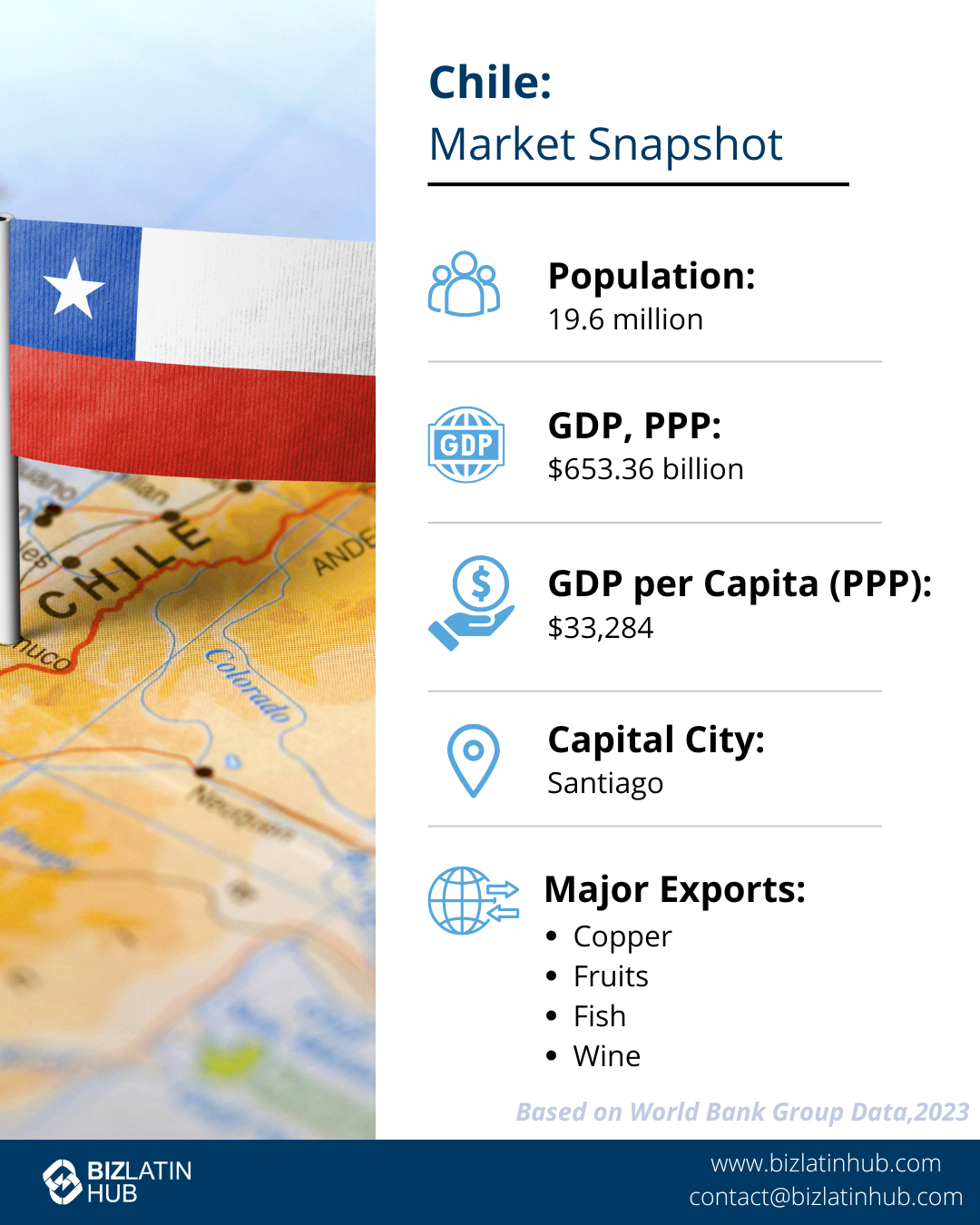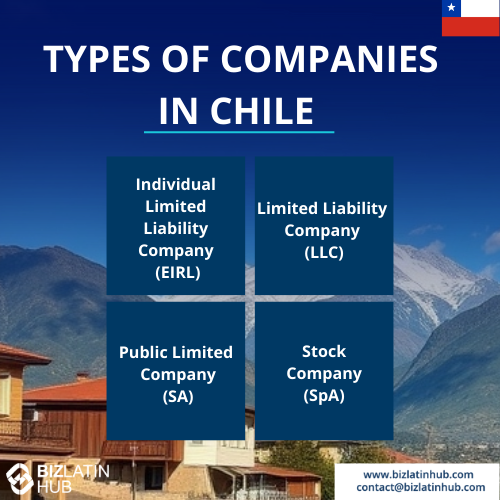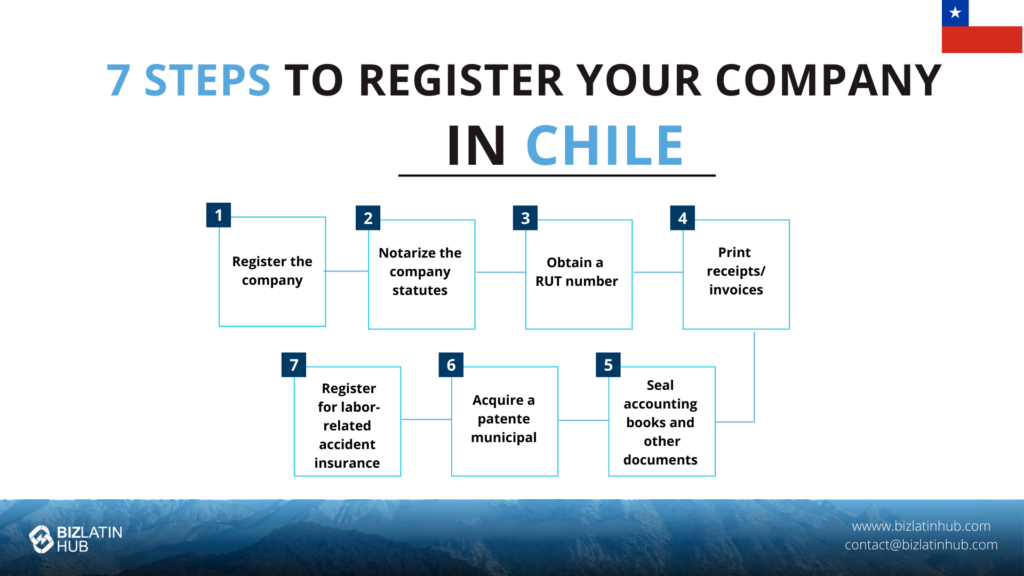
Company Formation in Chile: a 7 step guide
Understanding company formation in Chile is essential for foreign investors to thrive in this booming market. By following our guide, it will make your journey doing business in Chile that much easier, assisting with your research and preparation. Biz Latin Hub offers unparalleled local knowledge and a comprehensive suite of back-office services, allowing you to focus on growing your business and making Chile part of your success.
Key Takeaways On Company Formation in Chile
| Is Foreign Ownership Permitted in Chile? | Business can be 100% foreign-owned by either legal persons (legal entities) or natural persons (individuals). |
| Steps for Company Formation in Chile: | Step 1 – Register the company. Step 2 – Notarize the company statutes. Step 3 – Obtain a RUT number. Step 4 – Print receipts/invoices. Step 5 – Seal accounting books and other documents. Step 6 – Acquire a patente municipal. Step 7 – Register for labor-related accident insurance. |
| What Are The Common Entity Types in Chile? | Individual Limited Liability Company (EIRL). Limited Liability Company (LLC). Corporation (SA). Stock Company (SpA). |
| Why Setup a Business in Chile? | Chile has made the online process to register a business in Chile extremely easy, meaning you can do the whole process outside the country. |
How to Incorporate a Company in Chile – Step-by-Step Guide
You must understand each step of the company formation process before you begin. Below is a detailed step-by-step guide to help familiarize yourself with the system in Chile.
It takes approximately 2 to 4 weeks to complete the process of company formation in Chile once you have all of the required documents. Here are the 7 steps you will need to follow:
- Step 1 – Register the company.
- Step 2 – Notarize the company statutes.
- Step 3 – Obtain a RUT number.
- Step 4 – Print receipts/invoices.
- Step 5 – Seal accounting books and other documents.
- Step 6 – Acquire a patente municipal.
- Step 7 – Register for labor-related accident insurance.
Step 1 – Register the company and obtain the authentication number
Apply for the authentication number at the Chilean Chamber of Commerce or the corresponding regional office. This is a unique identifier for the company and is required for all business activities.
Step 2 – Notarize the company statutes and digitally signed by the notary
The company statutes outline the structure and regulations of the company. It is essential to have these notarized by a public notary in Chile, and the document should be digitally signed to ensure its authenticity.
Step 3 – Obtain a RUT number by registering with the Internal Revenue Service (SII in Spanish)
The RUT (Rol Único Tributario) number is the company’s tax identification number. This number is necessary for all tax-related activities in Chile, including paying taxes, issuing invoices, and importing/exporting goods.
Step 4 – Print receipts/invoices at an authorized printing company
Receipts and invoices must be printed at a certified printing company in Chile. These documents are used for accounting and tax purposes and must comply with Chilean regulations.
Step 5 – Seal accounting books and other documents with the Chilean Tax authority
After registering the company with the Chilean Tax Authority (Servicio de Impuestos Internos), the accounting books and other financial documents must be stamped or sealed by the authority.
Step 6 – Acquire a patente municipal working license from the municipality
The patente municipal is a business license issued by the local municipality where the company is located. This license authorizes the company to operate and is necessary for many business activities.
Step 7 – Register for labor-related accident insurance
All employers in Chile are required to provide accident insurance for their employees. This insurance covers medical expenses and lost wages in the event of a work-related injury or illness.
Important Note: If the company has foreign shareholders, then a Power of Attorney (POA), apostille process, and translation of documents may be required.

Legal Structures Available for Company Formation in Chile
Company formation in Chile is a multi-step process, and one of the initial and most crucial decisions you’ll make is selecting the correct types of company in Chile. The type of company you choose will have significant implications on aspects such as liability, taxation, and administrative requirements. In Chile, there are several types of companies to choose from, each with its own set of characteristics and requirements.
Here are the 4 types of Chilean companies:
- Individual Limited Liability Company (EIRL).
- Limited Liability Company (LLC).
- Corporation (SA).
- Stock Company (SpA).
Below, we will provide an overview of the most common types of company formation in Chile to help you understand the options available and make an informed decision for your business.

1. Individual Limited Liability Company (EIRL)
A Individual Limited Liability Company (Empresa Individual de Responsabilidad Limitada EIRL) is a good choice when you are the sole business owner. An EIRL is a legal entity that can conduct most business activities, except for a select few reserved for corporations.
As the owner, you are only liable for the amount you invest in the company, and the company is liable for all its assets. The company name should reflect the goods or services it offers or incorporate the owner’s name.
2. Limited Liability Company (LLC)
You can form an LLC with anything between 2 to 50 shareholders, and the company name must illustrate the goods or services it provides or include the name of one or more partners. There is no minimum capital requirement, and the partners can decide on the company’s activities and choose its management. Forming an LLC is a popular option.
3. Public Limited Company (SA)
A public limited company (Sociedad Anónima or SA) is another option for company formation. A corporation requires a group of shareholders that establish a common fund and a board of directors that administer the company and make decisions via a majority vote.
Each shareholder is liable to the extent of their capital contribution. The starting capital of a corporation must be fully subscribed and paid within three years. There are two types of corporations: public corporations and closed corporations.
4. Stock Company (SpA)
A stock company (Sociedad por Acciones or SpA) adhere to the same regulations as closed corporations, and their management is handled in a nearly identical manner. Stock companies can be formed by one or more individuals and their capital participation is represented by shares. In our experience, this is one of the easiest companies to start and always a strong recommendation.
To begin company formation in Chile, it is vital to have an excellent understanding of the various types of legal entities and choose the one that best reflects your business.
What are the Minimum Requirements to Incorporate a SpA in Chile?
The minimum requirements to incorporate a SpA in Chile are:
- A name for your legal entity.
- (1) shareholder, which can be either a natural person (individual) or legal person (entity).
- Appoint a legal representative within the bylaws of the company.
- Register a fiscal address which must be within the country and is used for official correspondence.
These are the minimum requirements to incorporate a SpA in Chile. It’s important to note that the process can involve other steps and documents, depending on the specific circumstances of your business and the type of company you’re setting up. It’s highly recommended to seek professional legal and business advice when starting a company in Chile to ensure compliance with all regulations and to make the process as smooth as possible.
Important Recommendations(s):
The founding shareholders do not need to physically travel to the country as company formation in Chile can be completed via a power of attorney.
You will need a local legal representative who is resident in the country. While you must have a local address, you can operate a virtual office if you so wish.
Although a company can be incorporated with a zero minimum share capital, we would recommend against this as monies must be deposited to activate the company bank account.
How Do I Set Up a Company in Chile?
It is vital that you have the necessary documents and information organized before you start the process of setting up your company in Chile. Below we have highlighted the key resources you need to present.
To proceed with incorporating a SpA in Chile, you will need to provide the following:
- A name for your legal entity.
- Shareholder identification document.
- The business activities, corporate purpose, and primary operations.
- Minimum initial capital to be registered.
Important Tip: We always recommend having a preferred legal name and two alternatives in case the primary legal name is unavailable.
Bank account requirements in Chile
A company must have a corporate bank account in Chile to conduct financial transactions, such as receiving payments and paying suppliers or employees. This is an important step in the process for company formation in Chile. Once your bank account has been activated, then the company you have formed can begin commercial operations.
Typically, to open a company bank account you will require the company’s articles of incorporation, its registrations, publications, a valid local tax ID, an initiation of activities affidavit issued by local tax authorities, and possibly, copies of past tax filings.
The following banks offer a variety of services tailored to international businesses, such as foreign currency accounts, international wire transfers and trade finance solutions.
- Banco de Chile
- Banco Santander Chile
- Banco Estado (Banco del Estado de Chile)
- Banco de Crédito e Inversiones (BCI)
- Scotiabank Chile
- Itaú Corpbanca Chile
- Banco Security
- Banco de la Nación Argentina (BNA) – Sucursal Chile
Tax overview for company registration in Chile
Taxpayers in Chile are companies, individuals and other legal entities, affecting the income of all corporations and individuals. All individuals and companies are subject to an income tax on their monthly or annual income. The tax authority in Chile is the Internal Revenue Service (SII – Servicio de Impuestos Internos) which is a public organization and depends on government administration in Santiago, Chile.
Chilean accounting standards require companies to prepare their financial statements in Spanish and according to Normas Internacionales de información financiera (NIIF) or in English, IFRS and Principios de la Contabilidad Generalmente Aceptados. (PCGA). In general terms, and as far as all BLH clients in Chile are concerned, according to the current regulations, since 2009 all companies must follow the IFRS standards.
When carrying out business in Chile a company has to be registered and obtain a Chilean taxation number and tax ID (RUT). When a company’s deals with the country’s taxation, this number is required in order to deal with the national tax authorities. Moreover, every individual, including foreign individuals in Chile must obtain a Chilean National Tax ID and a password for the Chilean IRS website in order to be able to file their annual tax returns.
Publicly listed companies must have annual audits, as must large companies – this depends on number of employees, income, and/or assets and by sector. Full financial audits are also necessary for mergers and acquisitions as well as most foreign branches.
Tax overview:
- Corporate Income Tax: 27%
- VAT: 19%
- Tax ID (RUT) registration with SII
- Monthly tax filing obligations
- Employee social security contributions |

FAQs on company formation in Chile
Answers to some of the most common questions we get asked by our clients.
1: What is the process to incorporate a company in Chile?
Incorporating a company in Chile involves selecting a legal structure (commonly a SpA), drafting the articles of incorporation, notarizing the documents, registering with the Chilean Business Registry (Registro de Empresas y Sociedades), obtaining a tax ID (RUT) from the SII, and opening a corporate bank account. Foreign shareholders may also need to appoint a local legal representative.
2: What types of companies can foreign investors register in Chile?
The most common company types are:
Sociedad por Acciones (SpA),
Sociedad de Responsabilidad Limitada (SRL), and
Sociedad Anónima (SA).
The SpA is preferred due to its flexibility, minimal formalities, and ability to have a single shareholder.
3. How long does it take to register a company in Chile?
Company formation in Chile typically takes 2 to 4 weeks, depending on documentation and processing times with the notary, Business Registry, and tax office.
4: What are the requirements to incorporate a business in Chile?
Requirements include a company name, a Chilean address, at least one shareholder, a local legal representative (if foreign shareholders are involved), a bank account, and registration with the SII for tax purposes.
5: What are the tax implications of registering a company in Chile?
Companies are subject to corporate income tax (27%), VAT (19%), and must comply with monthly declarations to the SII. Additional obligations include employee social contributions if hiring locally.
Differences Between a SpA and an LTDA in Chile
| Aspect | Sociedad Anónima (SpA) | Limited Liability Company (LTDA) |
|---|---|---|
| A. Number of Shareholders | One shareholder. | One or more shareholders. |
| B. Administration | Entrusted to one or more individuals, legal entities, or a Board of Directors. | Entrusted to one or more shareholders. |
| C. Responsibility of Shareholders | Shareholders are liable only up to the amount of their capital contributions. | Shareholders are liable only up to the amount of their capital contributions. |
| D. Social Capital | Divided into shares. | Percentage of rights over the company with no specific allocation to certain assets. |
| E. Changes of Ownership | Any shareholder can unilaterally sell shares. | Existing owners need to approve the entry of new owners. |
Benefits of Incorporating in Chile for International Investors
Though smaller in size compared to its neighbors, Chile is currently drawing levels of Foreign Direct Investment (FDI) similar to Mexico. In recent years, Chile has made it extremely convenient to start a business, with new laws allowing for online company formation in Chile within a day. However, corporate laws may differ from those in other countries. Therefore, it’s best to seek guidance from a local legal expert before you start a company in the country.
Chile’s impressive year-on-year GDP growth of 1.9% in 2023 is a testament to its strong legal system, macroeconomic stability, abundant natural resources, and high-quality infrastructure. With a total GDP of USD$344 billion and a GDP (PPP) per capita surpassing the regional average, at over USD$29,000, Chile has grown impressively.
How can Biz Latin Hub help with company formation in Chile?
At Biz Latin Hub, our multilingual team of company formation specialists has extensive experience in supporting foreign executives when starting a business in Chile. We offer a complete set of services for your business needs, such as legal, accounting, and recruitment support. You can rely on us as your main contact for entering and doing business in Chile or any of the other 17 markets in Latin America and the Caribbean where we operate.
Contact us now for personalized assistance or a free quote on company formation in Chile.
Learn more about our team and expert authors.





